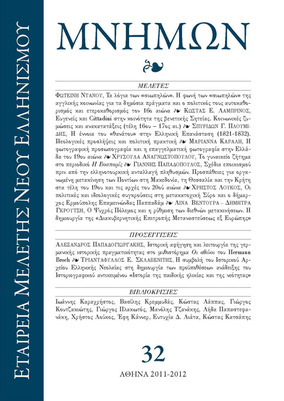Στοιχεία για τις σχέσεις του Αλέξανδρου Ελλάδιου με τη Ρωσία
Part of : Μνήμων ; Vol.19, 1997, pages 9-39
Issue:
Pages:
9-39
Parallel Title:
On the relations of Alexander Helladius with Russia
Section Title:
Articles
Abstract:
Alexander Helladius (ca. 1686- ?) from Larissa was an important Greek intellectual and made a name for himself in Western Europe through his studies and activities in various countries. The objective of this paper is to examine his relations with Russia, the emerging political and military power of the Orthodox East at the beginning of the eighteenth century. Helladius met with Peter the Great through the help of Robert Erskine, Peter's personal physician, in Karlsbad in 1712 and decided to dedicate his magnum opus Status praesens Ecclesiae Graecae [Altdorf] (1714) to the Czar as a sign of extreme admiration and as a token of gratitude. Probably, through that act Helladius was intending to secure his future move to Russia, where numerous Greeks were living and working at that time including some of his friends (e.g., Anastasios Michail from Nausea). Helladius arrived to Moscow in September of 1715 and was employed as a physician, since he had studied medicine earlier at the University of Altdorf. Although his further whereabouts in Russia still remain unknown, Helladius played several years later indirectly a role through his book Status in the condemnation of his compatriots, Serapheim from Mytilini in 1732 and Liverios Golettis in 1734. Russia's most eminent ecclesiastical figure at that time, Feofan Prokopovich, used the information provided by Helladius in his Status about these two persons as additional evidence in order to achieve their condemnation. It is hoped that the investigation of archival material in the future will shed more light on Helladius' activities in Russia and will unearth an ignored side of the Graeco-Russian relations of that period.
Subject:
Subject (LC):




